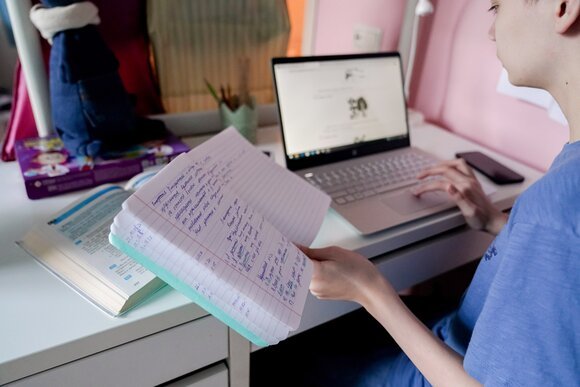 In Moscow, schoolchildren from grades 6 to 11 will study remotely until the end of October. Many parents don’t want to go back to remote study: it’s hard. Literature teacher and mother Irina Lukyanova gives 10 tips to help you get through this time, save energy and teach your child new things.
In Moscow, schoolchildren from grades 6 to 11 will study remotely until the end of October. Many parents don’t want to go back to remote study: it’s hard. Literature teacher and mother Irina Lukyanova gives 10 tips to help you get through this time, save energy and teach your child new things.

Irina Lukyanova
Probably no one has good advice for a distant student: this is a very individual matter. Some people are more organized, some are less. Someone can receive help from parents, others cannot. For some, the school has built a coherent and uniform environment for remote communication, while for others, teachers still send assignments out of order: some via VKontakte, some via Telegram, others via WhatsApp or Viber.
What can help everyone with this? I’ll try to share my experience. I constantly have remote meetings in the zoom, and I’m also a mother of unorganized children and a teacher at a distance.
1. Schedule and Tasks in One Place
You need a clear schedule of classes and a clear understanding of what is assigned.
It is better to keep all tasks in one place. If the school does not cope with this, does not collect them in a Google class or somewhere else, then it makes sense to start a banal school diary or an old diary if it is more convenient for you to write with a pen.
Or you can enter them into any convenient gadget program, if the one who will track it is old enough to use it. If a non-adult and unorganized person will use it, then visibility is needed: all the schedule and all classes should be on a large sheet of paper in sight. You can cross out what is done.
2. Set Alarms Before Classes
Those who have a habit of being late for remote classes should set alarms in their gadget. And if the lesson starts at 10:30, then set the alarm at 10:28: in order to have time to pull on your pants, comb your hair and turn on the computer, but not have time to be distracted.
3. Find A Quiet Place for Practicing (With Cats Will Be Ok, Too)
Even if it is impossible for the student to retire, try to find a quiet corner for him and not go there while he is busy. Dad in his underpants visible in the background, the screams of his little brother, mom with sudden educational monologues: all this distracts both the student and the teacher, and the whole class, especially if the microphone and video are on. Cats do not need to be removed, they make everyone happy.
4. Study at a Desk Wearing Decent Clothes
Joining a video class just out of bed wearing your pajamas is a bad idea. Even if the video is off. If a person goes to school, he goes to school. He puts on decent clothes, sits at the desk and works at it. It organizes and disciplines.
5. Drink Tea, But Do Not Eat While Studying
You can drink tea, water, coffee, etc. during the lesson, but not eat. Even if you have disabled video and audio. It just doesn’t work that way.
6. Answer at Least Every Other Lesson
It is unbearable to withstand the teacher’s gaze directed at you all the lessons in a row, and there is always a temptation to hide, turning off the video. But it makes sense to turn on at least every other lesson, answer something, or at least write to the chat.
This is called feedback. The teacher will be grateful and will definitely remember that you worked in the lesson.
7. Warm up During Breaks
Sitting at a table for six hours in a row is very difficult. During breaks, you should definitely stretch, do some exercises, lie on the floor.
8. Do Your Homework After Rest
There is no point in doing homework right after school. Nothing will come of it, you need to rest. It is better to change scenery: after sitting at home, go outside, if you are still allowed to go there.
If the child himself cannot remember that it is time to do homework, parental follow-up calls are sometimes useful. Control calls every hour or even every half an hour help some children to pull themselves together. But other people get nervous because of such calls. See what works for your child.
The control call should not be educational and reproaching: “Hey, you have not yet taken up work, shame on you!” Rather, it serves as a reminder, like an alarm clock: I help you remember that you have things to do. We can discuss how many of them you have, how long it will take to cope with them, and when the next control call is needed.
9. Prepare Questions for Parents in Advance
Difficult questions and matters can be put aside until the parents return. But they should be concretized. Instead of “I don’t understand anything”, which is a bad task for a tired mother: teach the child to set the task “explain to me how to solve problems for speed, time and distance”.
To make a list of everything incomprehensible and to specify questions is quite within the power of sixth graders and those who are older. Or it is a good skill to teach now.
10. Do not take it out during classes
For some, the distant is salvation, but for others it is terribly infuriating. We are fed up with teachers, tasks in ten different messengers, covid, restrictions associated with it. It is better to scold all of this from the bottom of your heart before taking up lessons with your child, to calm down, and then doing things calmly and confidently.
Your task is to help him complete the task, and not to take it out. His task is to complete the task, not to take it out. If both sides want to take it out on each other, you can shout into space “I am so sick of everything”, run around the house (as in A-C. Vestley’s book “Eight Children and a Truck”, repeating: “I’m angry I’m angry”), beat a punching bag, fight with pillows; and take lessons when all the anger is gone.
Nobody knows whether this will last for a long time or not, but let’s make sense and benefit from what we have: teach a child to structure time, clarify questions, organize his working day, master the ethics of online communication.
Let’s be glad that we don’t have to get up in the morning and go somewhere. While it’s the golden autumn it is not as obvious as in a sleepy and dark winter morning.
And let’s hope. Everything passes, and this too will pass. The main thing is not to waste this time in vain, while it is given to us for some reason. Let’s take what we can from it.
Translated by Alyona Malafeeva















